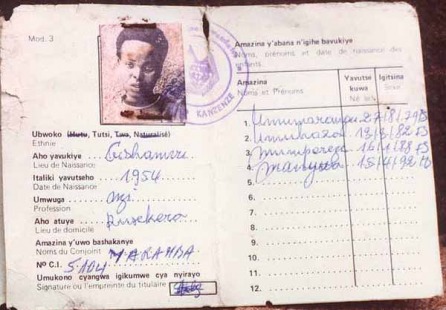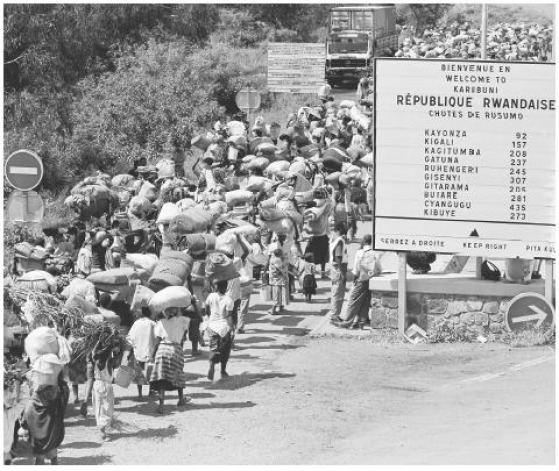Tharcisse Mukama:
Rwandan Genocide Survivor
Rwandan Genocide Survivor
Tharcisse Mukama's Timeline
1926 - The Belgians introduced identity cards.
1928 - Tharcisse Mukama was born in Ruhengeri.
1928 - Tharcisse Mukama was born in Ruhengeri.
Title.
1942 - Tharcisse Mukama finished his highschool education.
1950 - Mukama married Marahissa who was Hutu.
1959 - The King of Rwanda dies and the Hutu, who are supported by the Belgians, rise up against the Tutsi and their nobility.
1963 - Tutsis that were forced to flee in 1959 attack Rwanda from neighboring countries. Hutus attack the Tutsi in retaliation. More of the Tutsi gather their items and flee.
1950 - Mukama married Marahissa who was Hutu.
1959 - The King of Rwanda dies and the Hutu, who are supported by the Belgians, rise up against the Tutsi and their nobility.
1963 - Tutsis that were forced to flee in 1959 attack Rwanda from neighboring countries. Hutus attack the Tutsi in retaliation. More of the Tutsi gather their items and flee.
1967 - More massacres towards the Tutsi's from the Hutu's in Rwanda.
1973 - Tutsi's were forced to quit their jobs as teachers in schools and universities by the Hutu leaders and Major Juvenal Hayarimana creates a one party state. Tutsi's were availiable from the 9% percent of jobs.
1989 - World economic problems(especially the fall in coffee prices, one of Rwandans chief exports) increase the pressures on Rwandan country. In turn, this increases poverty and increases discontent.
1991/2 - Local persecutions of Tutsi's, including murders, are carried out.
1993 - August: Follwinf months of negotiations, Habyarimana and the RPF sign and peace and power sharing agreement- the Arusha Peace Accord. 2,500 U.N. troops are deployed to Rwanda to over see its implementation.
1993/4 - President Habyarimana delays implementation of power sharing. The extremist Hutu radio station,- Radio Mille Collines -starts broadcasting calls to attack the Tutsi's.
1994 - April 6th; President Habyarimana 's aeroplane is shot down. He and the President of neighboring Burundi is killed. The blame is placed on the Tutsis. The massacres of Tutsi's begins.
1994 - April 7th; They round up thousands of Tutsis and of moderate Hutu politicians including women and children; most are massacred using 'pangas'- machete like weapons. U.N. forces are forbidden to intervene, being only allowed to 'monitor' the situation.
1994 - April 30th; the situation is debated in the United Nations Security Council. They refuse to declare it a 'genocide' , which mean they would be forced to intervene.
1994 - May 17th; the U.N. agrees to send 6,800 troops and policemen, mostly African, to Rwanda with powers to defend civilians, although this is delayed because of over arguments over who will pay the bil and provide the equipment. A Security Council resolution says "acts of genocide may have been commited."
1973 - Tutsi's were forced to quit their jobs as teachers in schools and universities by the Hutu leaders and Major Juvenal Hayarimana creates a one party state. Tutsi's were availiable from the 9% percent of jobs.
1989 - World economic problems(especially the fall in coffee prices, one of Rwandans chief exports) increase the pressures on Rwandan country. In turn, this increases poverty and increases discontent.
1991/2 - Local persecutions of Tutsi's, including murders, are carried out.
1993 - August: Follwinf months of negotiations, Habyarimana and the RPF sign and peace and power sharing agreement- the Arusha Peace Accord. 2,500 U.N. troops are deployed to Rwanda to over see its implementation.
1993/4 - President Habyarimana delays implementation of power sharing. The extremist Hutu radio station,- Radio Mille Collines -starts broadcasting calls to attack the Tutsi's.
1994 - April 6th; President Habyarimana 's aeroplane is shot down. He and the President of neighboring Burundi is killed. The blame is placed on the Tutsis. The massacres of Tutsi's begins.
1994 - April 7th; They round up thousands of Tutsis and of moderate Hutu politicians including women and children; most are massacred using 'pangas'- machete like weapons. U.N. forces are forbidden to intervene, being only allowed to 'monitor' the situation.
1994 - April 30th; the situation is debated in the United Nations Security Council. They refuse to declare it a 'genocide' , which mean they would be forced to intervene.
1994 - May 17th; the U.N. agrees to send 6,800 troops and policemen, mostly African, to Rwanda with powers to defend civilians, although this is delayed because of over arguments over who will pay the bil and provide the equipment. A Security Council resolution says "acts of genocide may have been commited."
1994 - July 17th; the RPF invasion troops reach the capital, Kigali. Tutsi massacres stop.


